Monetary and Non-Monetary Rewards: Hilton Case Study
VerifiedAdded on 2023/01/06
|18
|5531
|2
Report
AI Summary
This report examines the significance of monetary and non-monetary reward systems in talent management within the hospitality sector, using Hilton as a case study. It explores the practices, importance, and challenges associated with implementing these systems, including attracting and retaining employees, fostering loyalty, and addressing issues like transparency and cost. The report also investigates the research methodology, including qualitative data collection through interviews. The research aims to understand the impact of different reward strategies on employee motivation and performance. The findings highlight the importance of aligning reward systems with talent management goals and provide recommendations for overcoming challenges. The report concludes with a reflection on the research methods used and references relevant literature, including a questionnaire in the appendix.
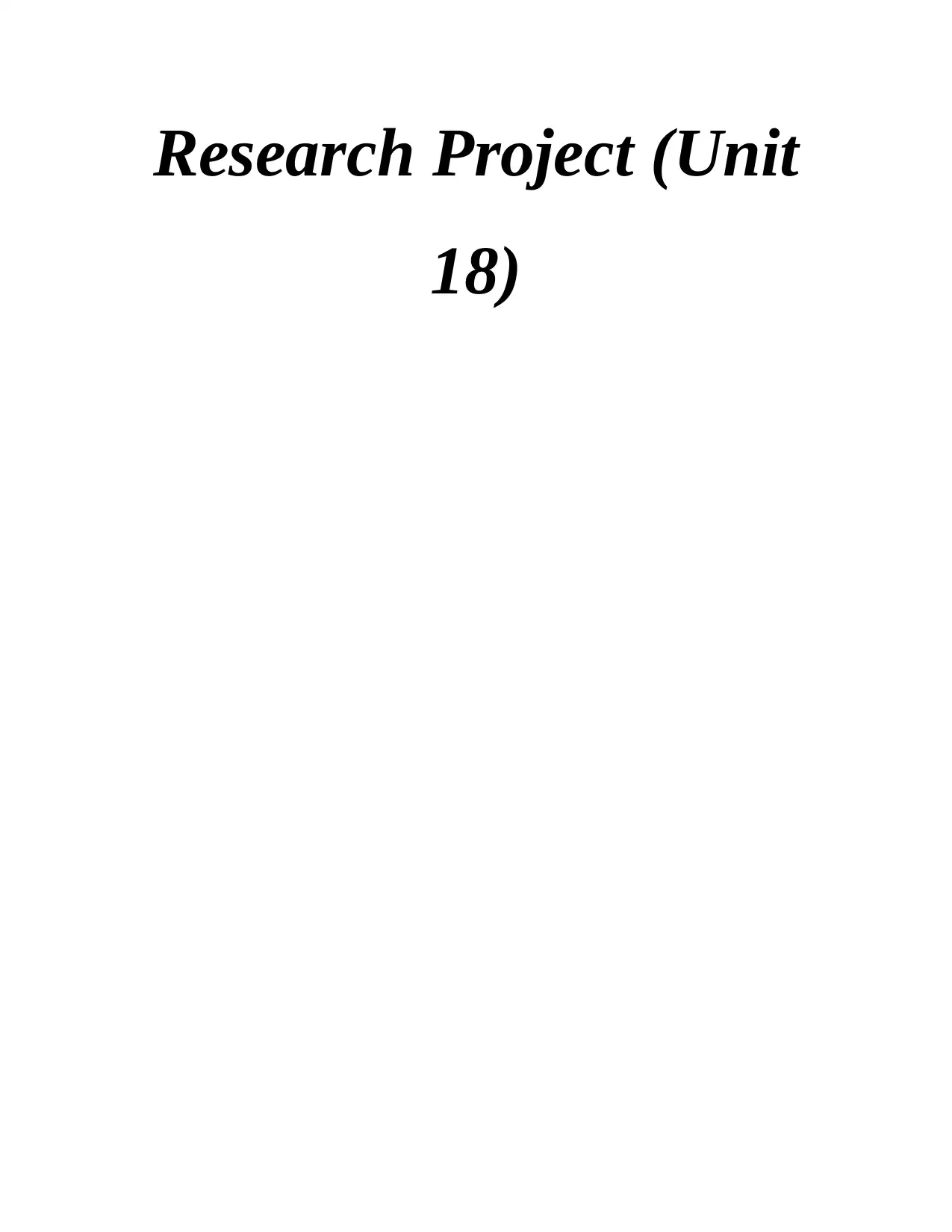
Research Project (Unit
18)
18)
Paraphrase This Document
Need a fresh take? Get an instant paraphrase of this document with our AI Paraphraser
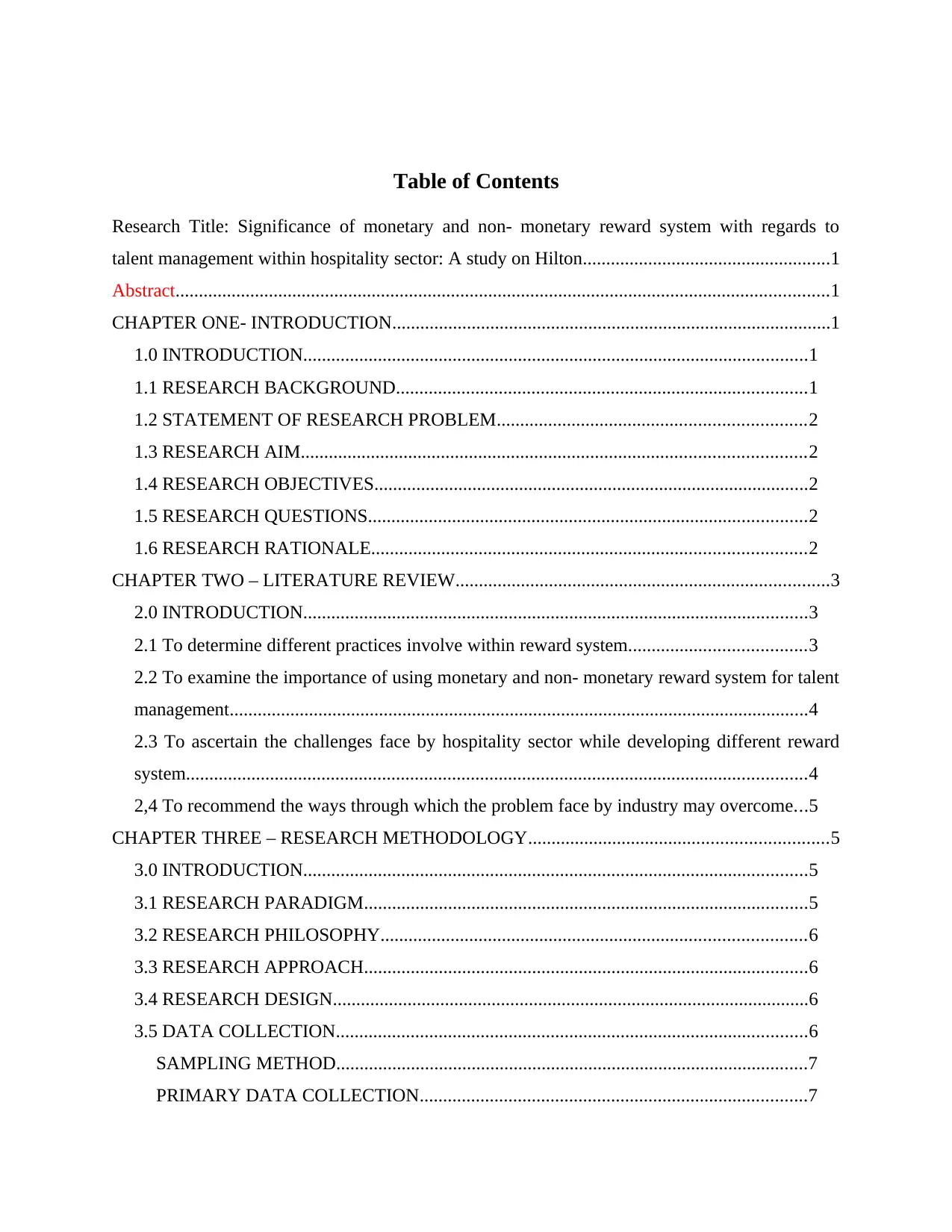
Table of Contents
Research Title: Significance of monetary and non- monetary reward system with regards to
talent management within hospitality sector: A study on Hilton.....................................................1
Abstract............................................................................................................................................1
CHAPTER ONE- INTRODUCTION..............................................................................................1
1.0 INTRODUCTION............................................................................................................1
1.1 RESEARCH BACKGROUND........................................................................................1
1.2 STATEMENT OF RESEARCH PROBLEM..................................................................2
1.3 RESEARCH AIM............................................................................................................2
1.4 RESEARCH OBJECTIVES.............................................................................................2
1.5 RESEARCH QUESTIONS..............................................................................................2
1.6 RESEARCH RATIONALE.............................................................................................2
CHAPTER TWO – LITERATURE REVIEW................................................................................3
2.0 INTRODUCTION............................................................................................................3
2.1 To determine different practices involve within reward system......................................3
2.2 To examine the importance of using monetary and non- monetary reward system for talent
management............................................................................................................................4
2.3 To ascertain the challenges face by hospitality sector while developing different reward
system.....................................................................................................................................4
2,4 To recommend the ways through which the problem face by industry may overcome...5
CHAPTER THREE – RESEARCH METHODOLOGY................................................................5
3.0 INTRODUCTION............................................................................................................5
3.1 RESEARCH PARADIGM...............................................................................................5
3.2 RESEARCH PHILOSOPHY...........................................................................................6
3.3 RESEARCH APPROACH...............................................................................................6
3.4 RESEARCH DESIGN......................................................................................................6
3.5 DATA COLLECTION.....................................................................................................6
SAMPLING METHOD.....................................................................................................7
PRIMARY DATA COLLECTION...................................................................................7
Research Title: Significance of monetary and non- monetary reward system with regards to
talent management within hospitality sector: A study on Hilton.....................................................1
Abstract............................................................................................................................................1
CHAPTER ONE- INTRODUCTION..............................................................................................1
1.0 INTRODUCTION............................................................................................................1
1.1 RESEARCH BACKGROUND........................................................................................1
1.2 STATEMENT OF RESEARCH PROBLEM..................................................................2
1.3 RESEARCH AIM............................................................................................................2
1.4 RESEARCH OBJECTIVES.............................................................................................2
1.5 RESEARCH QUESTIONS..............................................................................................2
1.6 RESEARCH RATIONALE.............................................................................................2
CHAPTER TWO – LITERATURE REVIEW................................................................................3
2.0 INTRODUCTION............................................................................................................3
2.1 To determine different practices involve within reward system......................................3
2.2 To examine the importance of using monetary and non- monetary reward system for talent
management............................................................................................................................4
2.3 To ascertain the challenges face by hospitality sector while developing different reward
system.....................................................................................................................................4
2,4 To recommend the ways through which the problem face by industry may overcome...5
CHAPTER THREE – RESEARCH METHODOLOGY................................................................5
3.0 INTRODUCTION............................................................................................................5
3.1 RESEARCH PARADIGM...............................................................................................5
3.2 RESEARCH PHILOSOPHY...........................................................................................6
3.3 RESEARCH APPROACH...............................................................................................6
3.4 RESEARCH DESIGN......................................................................................................6
3.5 DATA COLLECTION.....................................................................................................6
SAMPLING METHOD.....................................................................................................7
PRIMARY DATA COLLECTION...................................................................................7
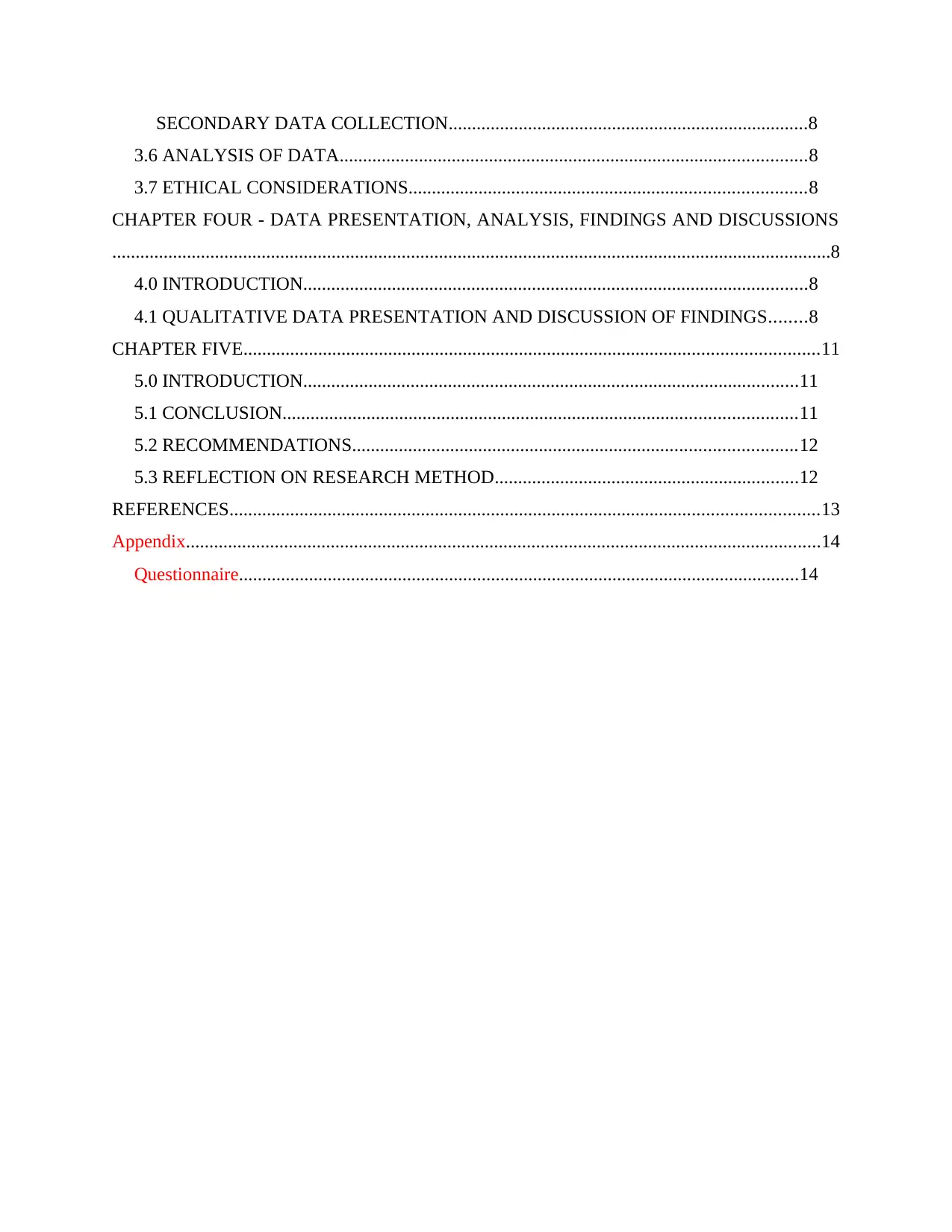
SECONDARY DATA COLLECTION.............................................................................8
3.6 ANALYSIS OF DATA....................................................................................................8
3.7 ETHICAL CONSIDERATIONS.....................................................................................8
CHAPTER FOUR - DATA PRESENTATION, ANALYSIS, FINDINGS AND DISCUSSIONS
..........................................................................................................................................................8
4.0 INTRODUCTION............................................................................................................8
4.1 QUALITATIVE DATA PRESENTATION AND DISCUSSION OF FINDINGS........8
CHAPTER FIVE...........................................................................................................................11
5.0 INTRODUCTION..........................................................................................................11
5.1 CONCLUSION..............................................................................................................11
5.2 RECOMMENDATIONS...............................................................................................12
5.3 REFLECTION ON RESEARCH METHOD.................................................................12
REFERENCES..............................................................................................................................13
Appendix........................................................................................................................................14
Questionnaire........................................................................................................................14
3.6 ANALYSIS OF DATA....................................................................................................8
3.7 ETHICAL CONSIDERATIONS.....................................................................................8
CHAPTER FOUR - DATA PRESENTATION, ANALYSIS, FINDINGS AND DISCUSSIONS
..........................................................................................................................................................8
4.0 INTRODUCTION............................................................................................................8
4.1 QUALITATIVE DATA PRESENTATION AND DISCUSSION OF FINDINGS........8
CHAPTER FIVE...........................................................................................................................11
5.0 INTRODUCTION..........................................................................................................11
5.1 CONCLUSION..............................................................................................................11
5.2 RECOMMENDATIONS...............................................................................................12
5.3 REFLECTION ON RESEARCH METHOD.................................................................12
REFERENCES..............................................................................................................................13
Appendix........................................................................................................................................14
Questionnaire........................................................................................................................14
⊘ This is a preview!⊘
Do you want full access?
Subscribe today to unlock all pages.

Trusted by 1+ million students worldwide
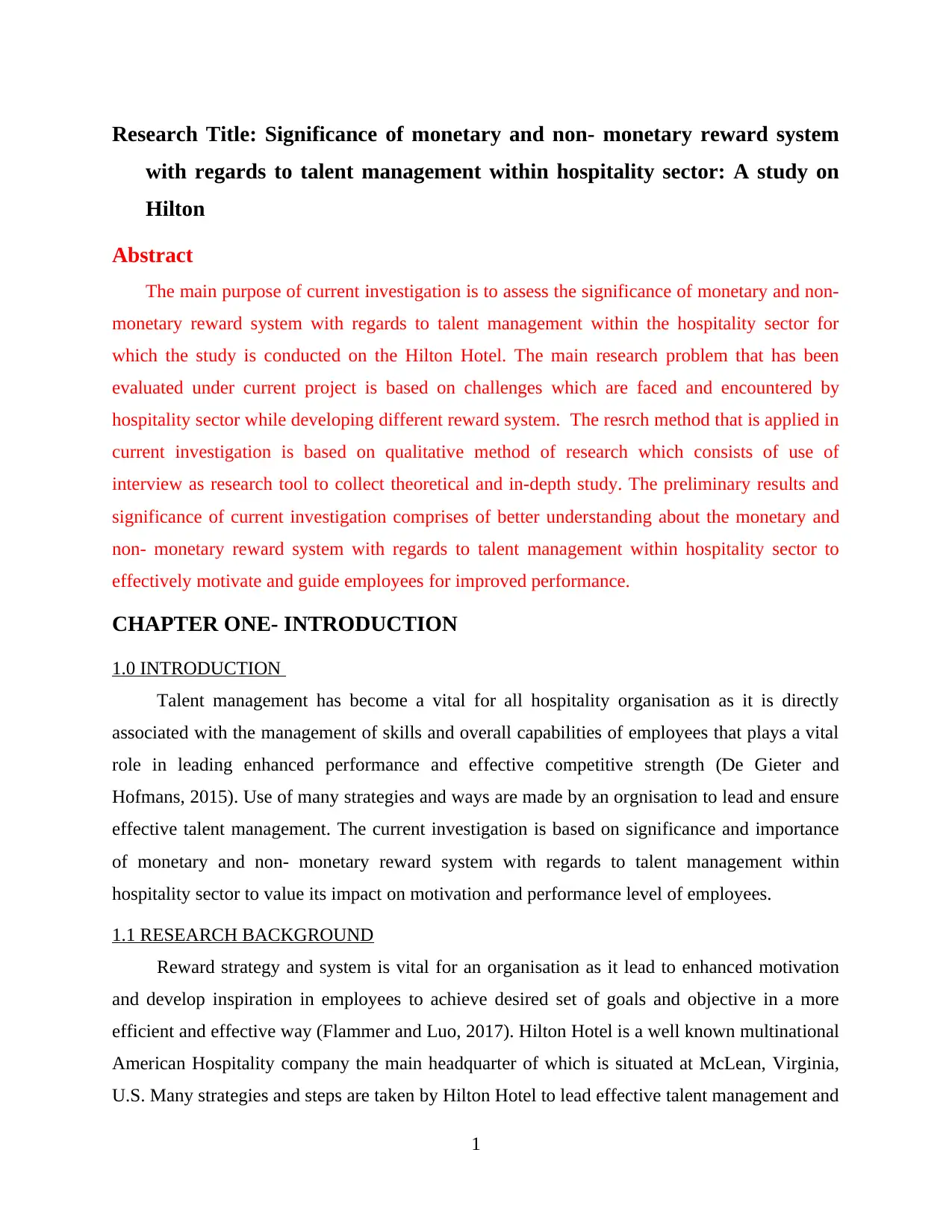
Research Title: Significance of monetary and non- monetary reward system
with regards to talent management within hospitality sector: A study on
Hilton
Abstract
The main purpose of current investigation is to assess the significance of monetary and non-
monetary reward system with regards to talent management within the hospitality sector for
which the study is conducted on the Hilton Hotel. The main research problem that has been
evaluated under current project is based on challenges which are faced and encountered by
hospitality sector while developing different reward system. The resrch method that is applied in
current investigation is based on qualitative method of research which consists of use of
interview as research tool to collect theoretical and in-depth study. The preliminary results and
significance of current investigation comprises of better understanding about the monetary and
non- monetary reward system with regards to talent management within hospitality sector to
effectively motivate and guide employees for improved performance.
CHAPTER ONE- INTRODUCTION
1.0 INTRODUCTION
Talent management has become a vital for all hospitality organisation as it is directly
associated with the management of skills and overall capabilities of employees that plays a vital
role in leading enhanced performance and effective competitive strength (De Gieter and
Hofmans, 2015). Use of many strategies and ways are made by an orgnisation to lead and ensure
effective talent management. The current investigation is based on significance and importance
of monetary and non- monetary reward system with regards to talent management within
hospitality sector to value its impact on motivation and performance level of employees.
1.1 RESEARCH BACKGROUND
Reward strategy and system is vital for an organisation as it lead to enhanced motivation
and develop inspiration in employees to achieve desired set of goals and objective in a more
efficient and effective way (Flammer and Luo, 2017). Hilton Hotel is a well known multinational
American Hospitality company the main headquarter of which is situated at McLean, Virginia,
U.S. Many strategies and steps are taken by Hilton Hotel to lead effective talent management and
1
with regards to talent management within hospitality sector: A study on
Hilton
Abstract
The main purpose of current investigation is to assess the significance of monetary and non-
monetary reward system with regards to talent management within the hospitality sector for
which the study is conducted on the Hilton Hotel. The main research problem that has been
evaluated under current project is based on challenges which are faced and encountered by
hospitality sector while developing different reward system. The resrch method that is applied in
current investigation is based on qualitative method of research which consists of use of
interview as research tool to collect theoretical and in-depth study. The preliminary results and
significance of current investigation comprises of better understanding about the monetary and
non- monetary reward system with regards to talent management within hospitality sector to
effectively motivate and guide employees for improved performance.
CHAPTER ONE- INTRODUCTION
1.0 INTRODUCTION
Talent management has become a vital for all hospitality organisation as it is directly
associated with the management of skills and overall capabilities of employees that plays a vital
role in leading enhanced performance and effective competitive strength (De Gieter and
Hofmans, 2015). Use of many strategies and ways are made by an orgnisation to lead and ensure
effective talent management. The current investigation is based on significance and importance
of monetary and non- monetary reward system with regards to talent management within
hospitality sector to value its impact on motivation and performance level of employees.
1.1 RESEARCH BACKGROUND
Reward strategy and system is vital for an organisation as it lead to enhanced motivation
and develop inspiration in employees to achieve desired set of goals and objective in a more
efficient and effective way (Flammer and Luo, 2017). Hilton Hotel is a well known multinational
American Hospitality company the main headquarter of which is situated at McLean, Virginia,
U.S. Many strategies and steps are taken by Hilton Hotel to lead effective talent management and
1
Paraphrase This Document
Need a fresh take? Get an instant paraphrase of this document with our AI Paraphraser
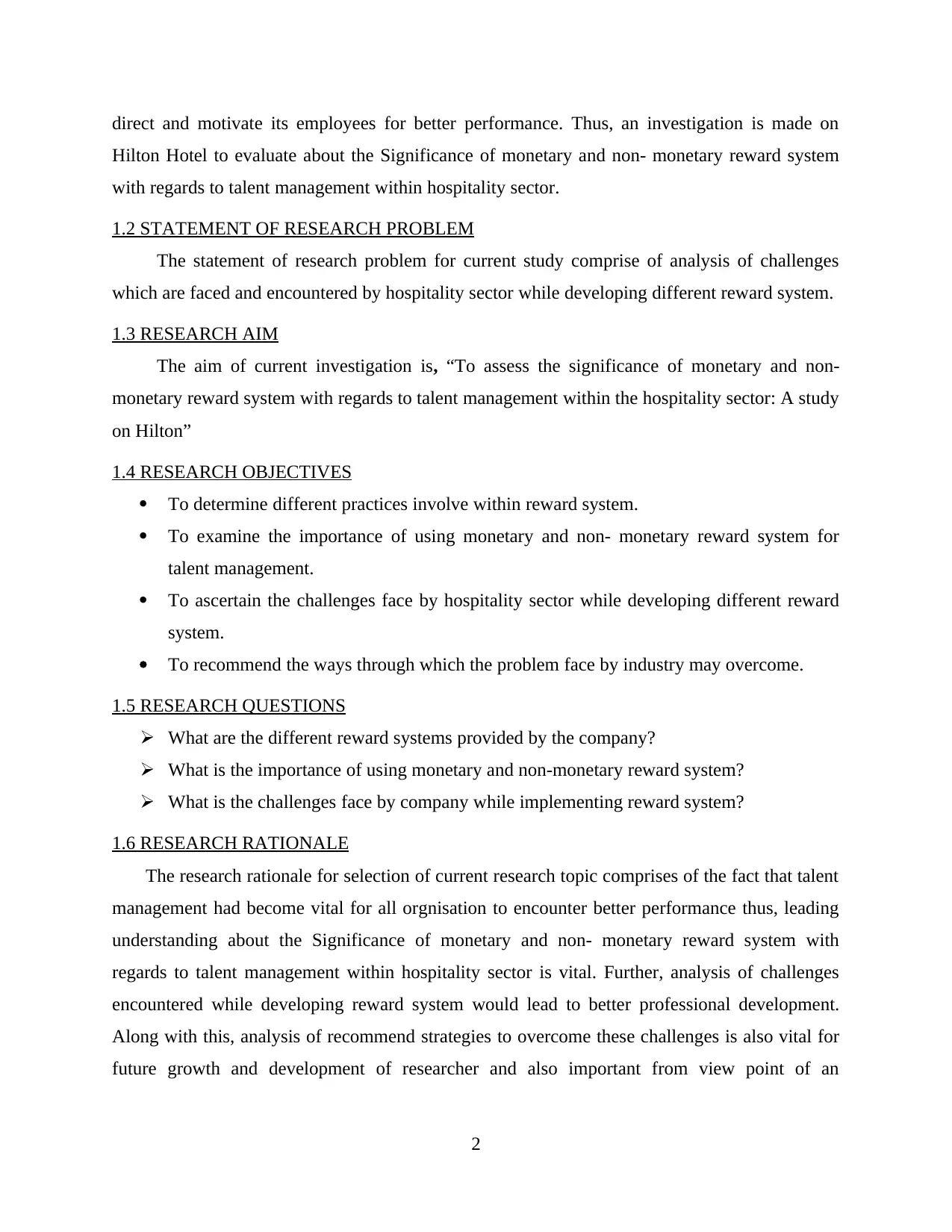
direct and motivate its employees for better performance. Thus, an investigation is made on
Hilton Hotel to evaluate about the Significance of monetary and non- monetary reward system
with regards to talent management within hospitality sector.
1.2 STATEMENT OF RESEARCH PROBLEM
The statement of research problem for current study comprise of analysis of challenges
which are faced and encountered by hospitality sector while developing different reward system.
1.3 RESEARCH AIM
The aim of current investigation is, “To assess the significance of monetary and non-
monetary reward system with regards to talent management within the hospitality sector: A study
on Hilton”
1.4 RESEARCH OBJECTIVES
To determine different practices involve within reward system.
To examine the importance of using monetary and non- monetary reward system for
talent management.
To ascertain the challenges face by hospitality sector while developing different reward
system.
To recommend the ways through which the problem face by industry may overcome.
1.5 RESEARCH QUESTIONS
What are the different reward systems provided by the company?
What is the importance of using monetary and non-monetary reward system?
What is the challenges face by company while implementing reward system?
1.6 RESEARCH RATIONALE
The research rationale for selection of current research topic comprises of the fact that talent
management had become vital for all orgnisation to encounter better performance thus, leading
understanding about the Significance of monetary and non- monetary reward system with
regards to talent management within hospitality sector is vital. Further, analysis of challenges
encountered while developing reward system would lead to better professional development.
Along with this, analysis of recommend strategies to overcome these challenges is also vital for
future growth and development of researcher and also important from view point of an
2
Hilton Hotel to evaluate about the Significance of monetary and non- monetary reward system
with regards to talent management within hospitality sector.
1.2 STATEMENT OF RESEARCH PROBLEM
The statement of research problem for current study comprise of analysis of challenges
which are faced and encountered by hospitality sector while developing different reward system.
1.3 RESEARCH AIM
The aim of current investigation is, “To assess the significance of monetary and non-
monetary reward system with regards to talent management within the hospitality sector: A study
on Hilton”
1.4 RESEARCH OBJECTIVES
To determine different practices involve within reward system.
To examine the importance of using monetary and non- monetary reward system for
talent management.
To ascertain the challenges face by hospitality sector while developing different reward
system.
To recommend the ways through which the problem face by industry may overcome.
1.5 RESEARCH QUESTIONS
What are the different reward systems provided by the company?
What is the importance of using monetary and non-monetary reward system?
What is the challenges face by company while implementing reward system?
1.6 RESEARCH RATIONALE
The research rationale for selection of current research topic comprises of the fact that talent
management had become vital for all orgnisation to encounter better performance thus, leading
understanding about the Significance of monetary and non- monetary reward system with
regards to talent management within hospitality sector is vital. Further, analysis of challenges
encountered while developing reward system would lead to better professional development.
Along with this, analysis of recommend strategies to overcome these challenges is also vital for
future growth and development of researcher and also important from view point of an
2
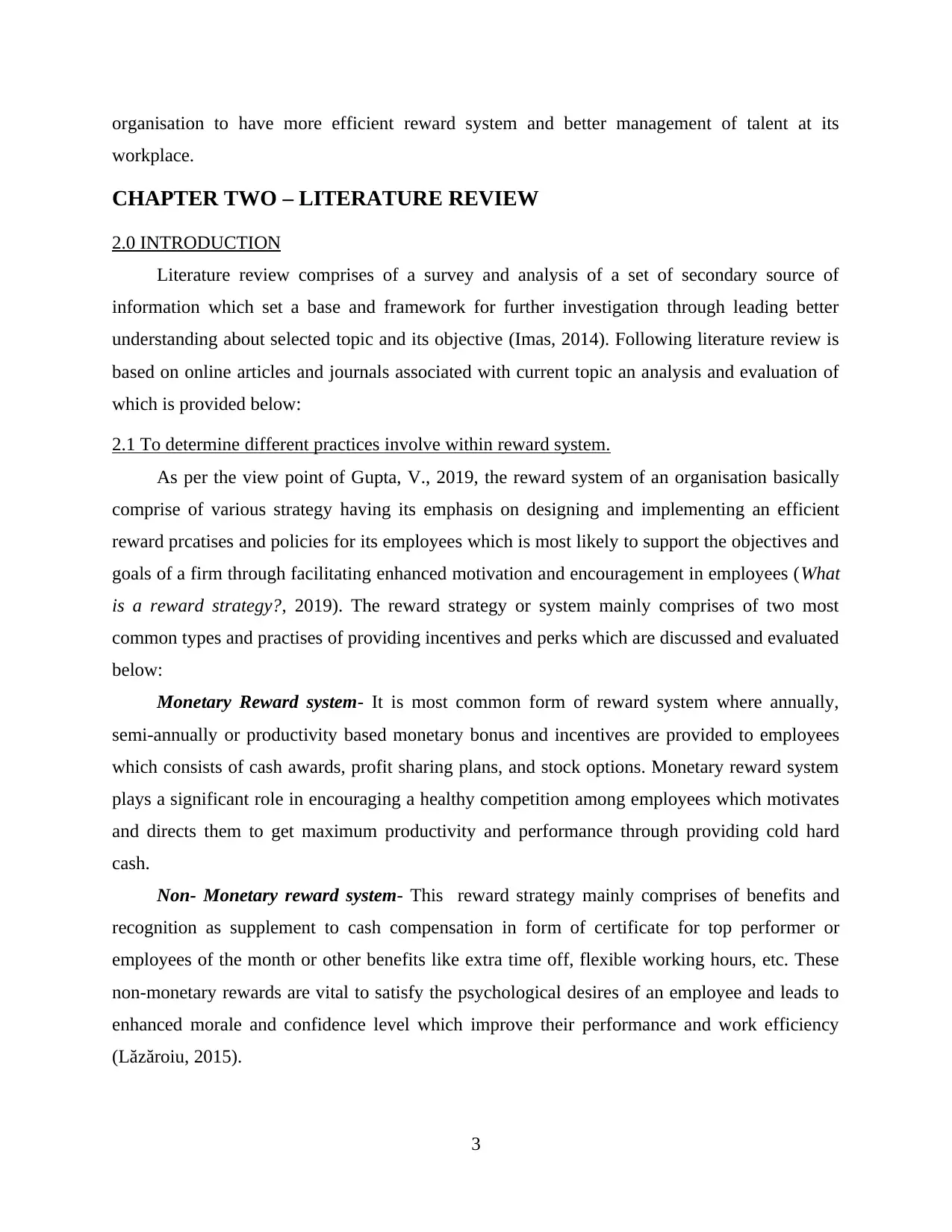
organisation to have more efficient reward system and better management of talent at its
workplace.
CHAPTER TWO – LITERATURE REVIEW
2.0 INTRODUCTION
Literature review comprises of a survey and analysis of a set of secondary source of
information which set a base and framework for further investigation through leading better
understanding about selected topic and its objective (Imas, 2014). Following literature review is
based on online articles and journals associated with current topic an analysis and evaluation of
which is provided below:
2.1 To determine different practices involve within reward system.
As per the view point of Gupta, V., 2019, the reward system of an organisation basically
comprise of various strategy having its emphasis on designing and implementing an efficient
reward prcatises and policies for its employees which is most likely to support the objectives and
goals of a firm through facilitating enhanced motivation and encouragement in employees (What
is a reward strategy?, 2019). The reward strategy or system mainly comprises of two most
common types and practises of providing incentives and perks which are discussed and evaluated
below:
Monetary Reward system- It is most common form of reward system where annually,
semi-annually or productivity based monetary bonus and incentives are provided to employees
which consists of cash awards, profit sharing plans, and stock options. Monetary reward system
plays a significant role in encouraging a healthy competition among employees which motivates
and directs them to get maximum productivity and performance through providing cold hard
cash.
Non- Monetary reward system- This reward strategy mainly comprises of benefits and
recognition as supplement to cash compensation in form of certificate for top performer or
employees of the month or other benefits like extra time off, flexible working hours, etc. These
non-monetary rewards are vital to satisfy the psychological desires of an employee and leads to
enhanced morale and confidence level which improve their performance and work efficiency
(Lăzăroiu, 2015).
3
workplace.
CHAPTER TWO – LITERATURE REVIEW
2.0 INTRODUCTION
Literature review comprises of a survey and analysis of a set of secondary source of
information which set a base and framework for further investigation through leading better
understanding about selected topic and its objective (Imas, 2014). Following literature review is
based on online articles and journals associated with current topic an analysis and evaluation of
which is provided below:
2.1 To determine different practices involve within reward system.
As per the view point of Gupta, V., 2019, the reward system of an organisation basically
comprise of various strategy having its emphasis on designing and implementing an efficient
reward prcatises and policies for its employees which is most likely to support the objectives and
goals of a firm through facilitating enhanced motivation and encouragement in employees (What
is a reward strategy?, 2019). The reward strategy or system mainly comprises of two most
common types and practises of providing incentives and perks which are discussed and evaluated
below:
Monetary Reward system- It is most common form of reward system where annually,
semi-annually or productivity based monetary bonus and incentives are provided to employees
which consists of cash awards, profit sharing plans, and stock options. Monetary reward system
plays a significant role in encouraging a healthy competition among employees which motivates
and directs them to get maximum productivity and performance through providing cold hard
cash.
Non- Monetary reward system- This reward strategy mainly comprises of benefits and
recognition as supplement to cash compensation in form of certificate for top performer or
employees of the month or other benefits like extra time off, flexible working hours, etc. These
non-monetary rewards are vital to satisfy the psychological desires of an employee and leads to
enhanced morale and confidence level which improve their performance and work efficiency
(Lăzăroiu, 2015).
3
⊘ This is a preview!⊘
Do you want full access?
Subscribe today to unlock all pages.

Trusted by 1+ million students worldwide
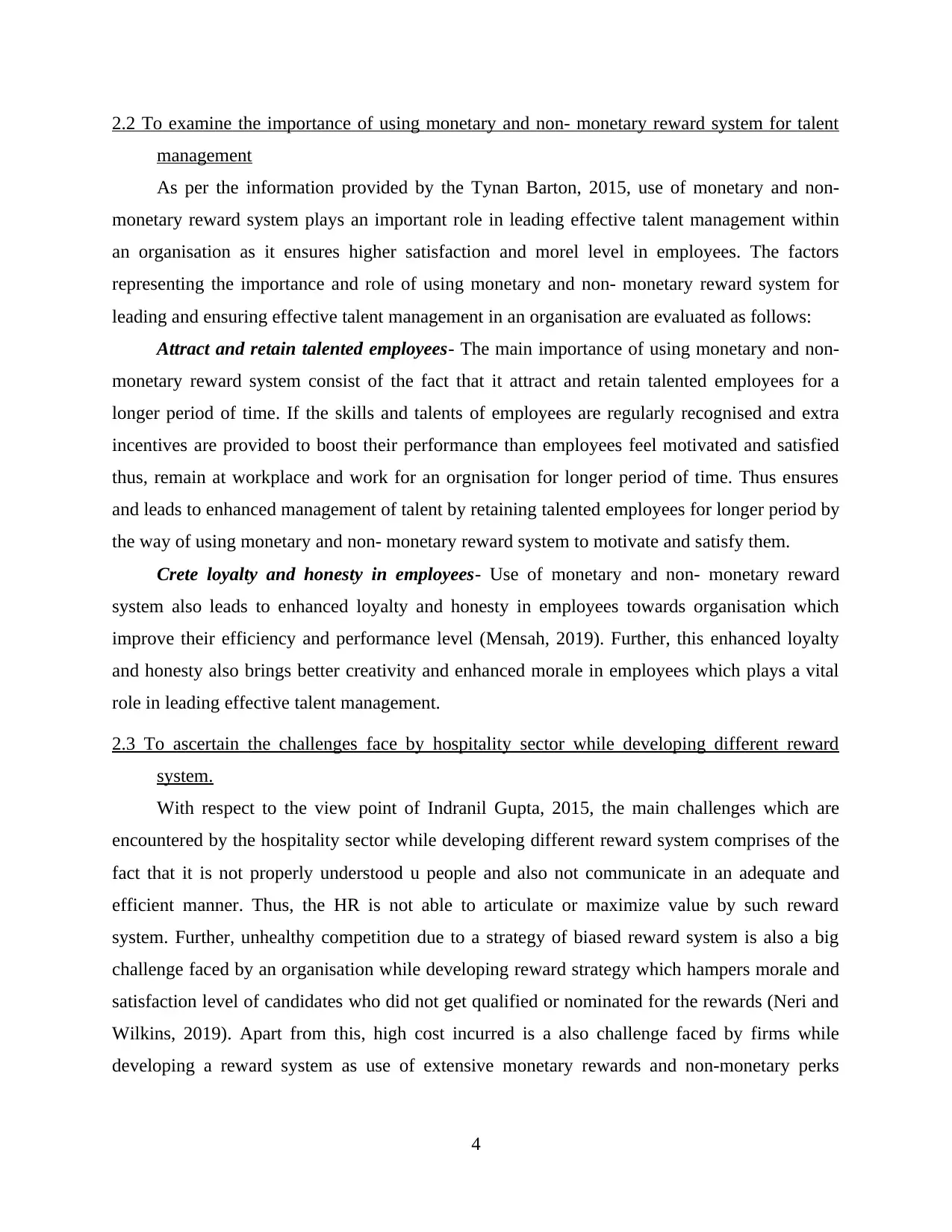
2.2 To examine the importance of using monetary and non- monetary reward system for talent
management
As per the information provided by the Tynan Barton, 2015, use of monetary and non-
monetary reward system plays an important role in leading effective talent management within
an organisation as it ensures higher satisfaction and morel level in employees. The factors
representing the importance and role of using monetary and non- monetary reward system for
leading and ensuring effective talent management in an organisation are evaluated as follows:
Attract and retain talented employees- The main importance of using monetary and non-
monetary reward system consist of the fact that it attract and retain talented employees for a
longer period of time. If the skills and talents of employees are regularly recognised and extra
incentives are provided to boost their performance than employees feel motivated and satisfied
thus, remain at workplace and work for an orgnisation for longer period of time. Thus ensures
and leads to enhanced management of talent by retaining talented employees for longer period by
the way of using monetary and non- monetary reward system to motivate and satisfy them.
Crete loyalty and honesty in employees- Use of monetary and non- monetary reward
system also leads to enhanced loyalty and honesty in employees towards organisation which
improve their efficiency and performance level (Mensah, 2019). Further, this enhanced loyalty
and honesty also brings better creativity and enhanced morale in employees which plays a vital
role in leading effective talent management.
2.3 To ascertain the challenges face by hospitality sector while developing different reward
system.
With respect to the view point of Indranil Gupta, 2015, the main challenges which are
encountered by the hospitality sector while developing different reward system comprises of the
fact that it is not properly understood u people and also not communicate in an adequate and
efficient manner. Thus, the HR is not able to articulate or maximize value by such reward
system. Further, unhealthy competition due to a strategy of biased reward system is also a big
challenge faced by an organisation while developing reward strategy which hampers morale and
satisfaction level of candidates who did not get qualified or nominated for the rewards (Neri and
Wilkins, 2019). Apart from this, high cost incurred is a also challenge faced by firms while
developing a reward system as use of extensive monetary rewards and non-monetary perks
4
management
As per the information provided by the Tynan Barton, 2015, use of monetary and non-
monetary reward system plays an important role in leading effective talent management within
an organisation as it ensures higher satisfaction and morel level in employees. The factors
representing the importance and role of using monetary and non- monetary reward system for
leading and ensuring effective talent management in an organisation are evaluated as follows:
Attract and retain talented employees- The main importance of using monetary and non-
monetary reward system consist of the fact that it attract and retain talented employees for a
longer period of time. If the skills and talents of employees are regularly recognised and extra
incentives are provided to boost their performance than employees feel motivated and satisfied
thus, remain at workplace and work for an orgnisation for longer period of time. Thus ensures
and leads to enhanced management of talent by retaining talented employees for longer period by
the way of using monetary and non- monetary reward system to motivate and satisfy them.
Crete loyalty and honesty in employees- Use of monetary and non- monetary reward
system also leads to enhanced loyalty and honesty in employees towards organisation which
improve their efficiency and performance level (Mensah, 2019). Further, this enhanced loyalty
and honesty also brings better creativity and enhanced morale in employees which plays a vital
role in leading effective talent management.
2.3 To ascertain the challenges face by hospitality sector while developing different reward
system.
With respect to the view point of Indranil Gupta, 2015, the main challenges which are
encountered by the hospitality sector while developing different reward system comprises of the
fact that it is not properly understood u people and also not communicate in an adequate and
efficient manner. Thus, the HR is not able to articulate or maximize value by such reward
system. Further, unhealthy competition due to a strategy of biased reward system is also a big
challenge faced by an organisation while developing reward strategy which hampers morale and
satisfaction level of candidates who did not get qualified or nominated for the rewards (Neri and
Wilkins, 2019). Apart from this, high cost incurred is a also challenge faced by firms while
developing a reward system as use of extensive monetary rewards and non-monetary perks
4
Paraphrase This Document
Need a fresh take? Get an instant paraphrase of this document with our AI Paraphraser
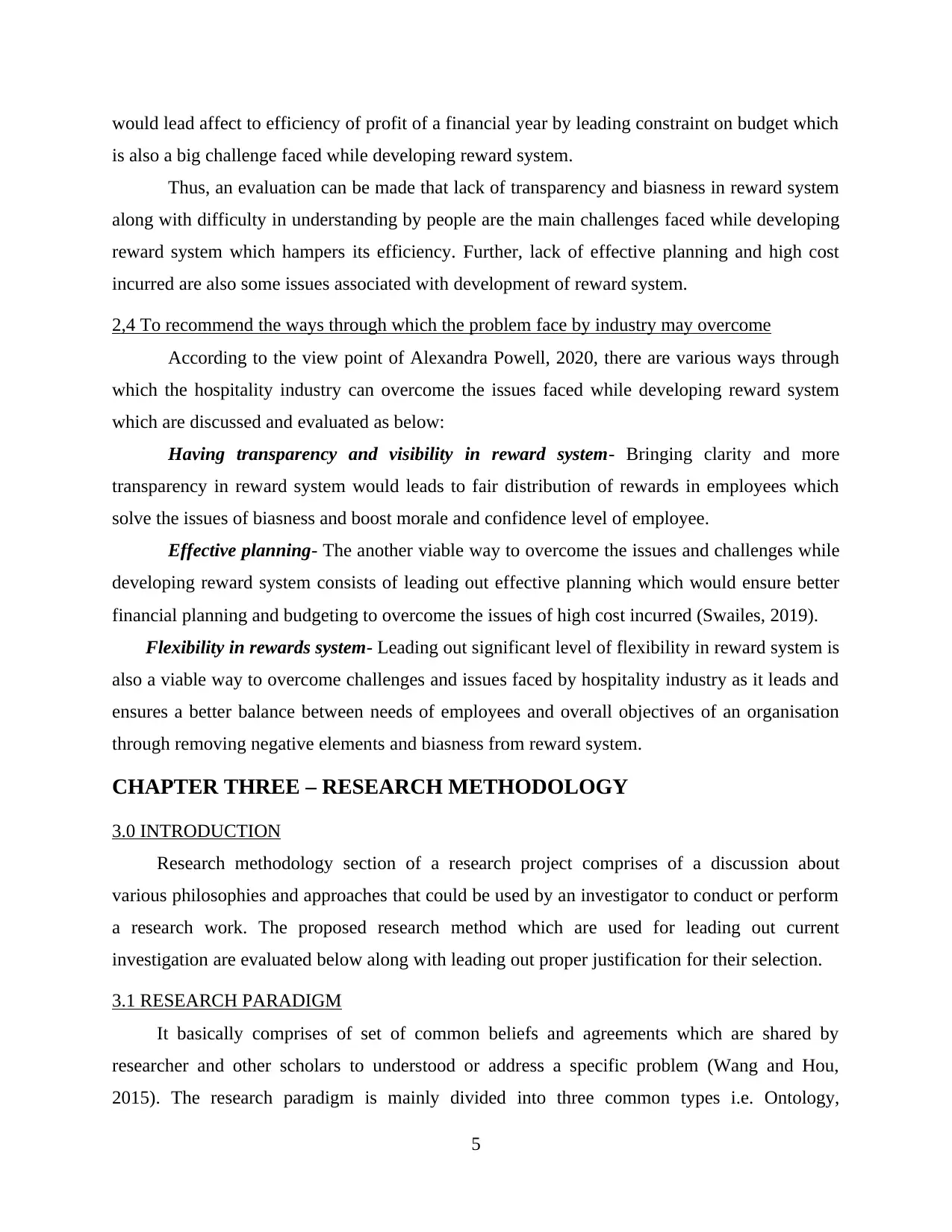
would lead affect to efficiency of profit of a financial year by leading constraint on budget which
is also a big challenge faced while developing reward system.
Thus, an evaluation can be made that lack of transparency and biasness in reward system
along with difficulty in understanding by people are the main challenges faced while developing
reward system which hampers its efficiency. Further, lack of effective planning and high cost
incurred are also some issues associated with development of reward system.
2,4 To recommend the ways through which the problem face by industry may overcome
According to the view point of Alexandra Powell, 2020, there are various ways through
which the hospitality industry can overcome the issues faced while developing reward system
which are discussed and evaluated as below:
Having transparency and visibility in reward system- Bringing clarity and more
transparency in reward system would leads to fair distribution of rewards in employees which
solve the issues of biasness and boost morale and confidence level of employee.
Effective planning- The another viable way to overcome the issues and challenges while
developing reward system consists of leading out effective planning which would ensure better
financial planning and budgeting to overcome the issues of high cost incurred (Swailes, 2019).
Flexibility in rewards system- Leading out significant level of flexibility in reward system is
also a viable way to overcome challenges and issues faced by hospitality industry as it leads and
ensures a better balance between needs of employees and overall objectives of an organisation
through removing negative elements and biasness from reward system.
CHAPTER THREE – RESEARCH METHODOLOGY
3.0 INTRODUCTION
Research methodology section of a research project comprises of a discussion about
various philosophies and approaches that could be used by an investigator to conduct or perform
a research work. The proposed research method which are used for leading out current
investigation are evaluated below along with leading out proper justification for their selection.
3.1 RESEARCH PARADIGM
It basically comprises of set of common beliefs and agreements which are shared by
researcher and other scholars to understood or address a specific problem (Wang and Hou,
2015). The research paradigm is mainly divided into three common types i.e. Ontology,
5
is also a big challenge faced while developing reward system.
Thus, an evaluation can be made that lack of transparency and biasness in reward system
along with difficulty in understanding by people are the main challenges faced while developing
reward system which hampers its efficiency. Further, lack of effective planning and high cost
incurred are also some issues associated with development of reward system.
2,4 To recommend the ways through which the problem face by industry may overcome
According to the view point of Alexandra Powell, 2020, there are various ways through
which the hospitality industry can overcome the issues faced while developing reward system
which are discussed and evaluated as below:
Having transparency and visibility in reward system- Bringing clarity and more
transparency in reward system would leads to fair distribution of rewards in employees which
solve the issues of biasness and boost morale and confidence level of employee.
Effective planning- The another viable way to overcome the issues and challenges while
developing reward system consists of leading out effective planning which would ensure better
financial planning and budgeting to overcome the issues of high cost incurred (Swailes, 2019).
Flexibility in rewards system- Leading out significant level of flexibility in reward system is
also a viable way to overcome challenges and issues faced by hospitality industry as it leads and
ensures a better balance between needs of employees and overall objectives of an organisation
through removing negative elements and biasness from reward system.
CHAPTER THREE – RESEARCH METHODOLOGY
3.0 INTRODUCTION
Research methodology section of a research project comprises of a discussion about
various philosophies and approaches that could be used by an investigator to conduct or perform
a research work. The proposed research method which are used for leading out current
investigation are evaluated below along with leading out proper justification for their selection.
3.1 RESEARCH PARADIGM
It basically comprises of set of common beliefs and agreements which are shared by
researcher and other scholars to understood or address a specific problem (Wang and Hou,
2015). The research paradigm is mainly divided into three common types i.e. Ontology,
5
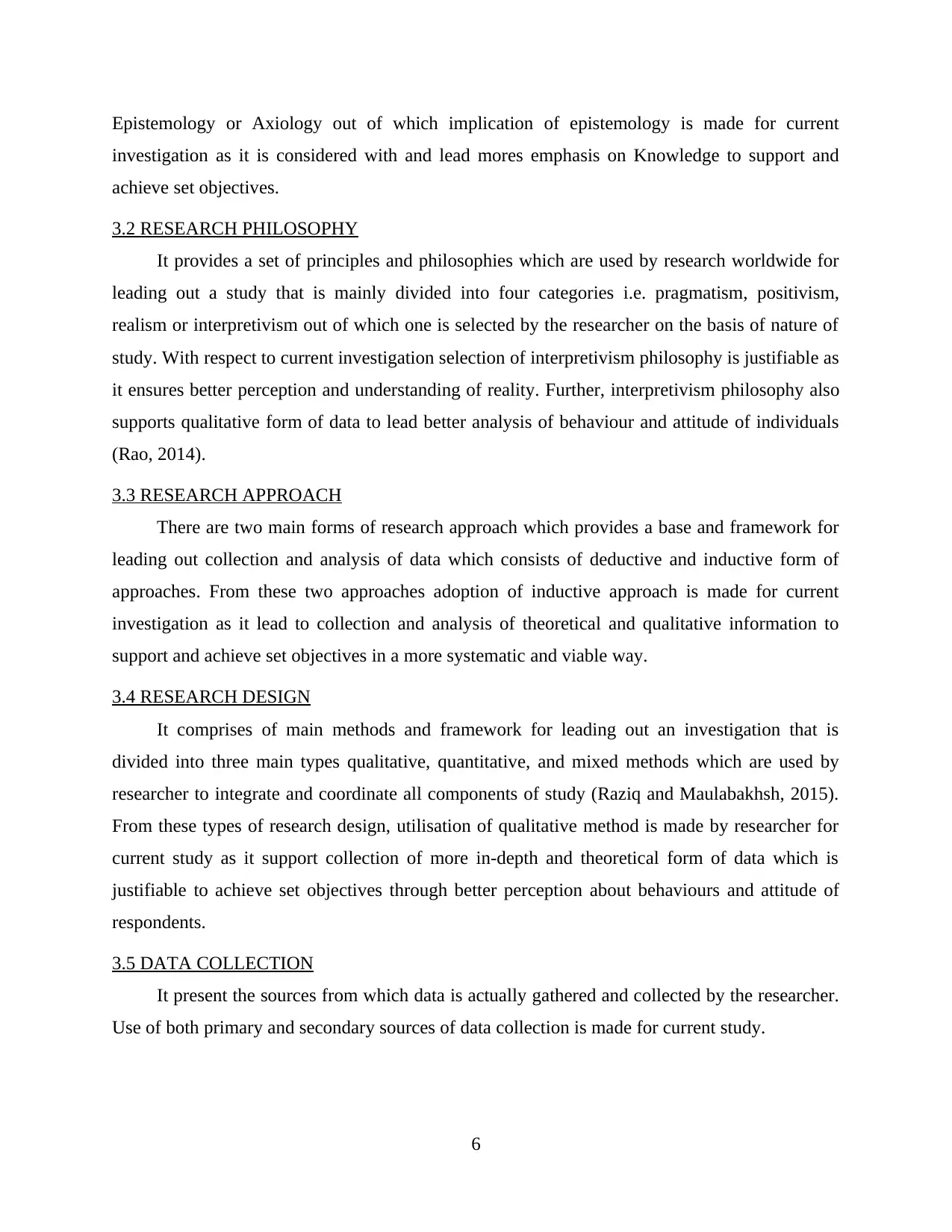
Epistemology or Axiology out of which implication of epistemology is made for current
investigation as it is considered with and lead mores emphasis on Knowledge to support and
achieve set objectives.
3.2 RESEARCH PHILOSOPHY
It provides a set of principles and philosophies which are used by research worldwide for
leading out a study that is mainly divided into four categories i.e. pragmatism, positivism,
realism or interpretivism out of which one is selected by the researcher on the basis of nature of
study. With respect to current investigation selection of interpretivism philosophy is justifiable as
it ensures better perception and understanding of reality. Further, interpretivism philosophy also
supports qualitative form of data to lead better analysis of behaviour and attitude of individuals
(Rao, 2014).
3.3 RESEARCH APPROACH
There are two main forms of research approach which provides a base and framework for
leading out collection and analysis of data which consists of deductive and inductive form of
approaches. From these two approaches adoption of inductive approach is made for current
investigation as it lead to collection and analysis of theoretical and qualitative information to
support and achieve set objectives in a more systematic and viable way.
3.4 RESEARCH DESIGN
It comprises of main methods and framework for leading out an investigation that is
divided into three main types qualitative, quantitative, and mixed methods which are used by
researcher to integrate and coordinate all components of study (Raziq and Maulabakhsh, 2015).
From these types of research design, utilisation of qualitative method is made by researcher for
current study as it support collection of more in-depth and theoretical form of data which is
justifiable to achieve set objectives through better perception about behaviours and attitude of
respondents.
3.5 DATA COLLECTION
It present the sources from which data is actually gathered and collected by the researcher.
Use of both primary and secondary sources of data collection is made for current study.
6
investigation as it is considered with and lead mores emphasis on Knowledge to support and
achieve set objectives.
3.2 RESEARCH PHILOSOPHY
It provides a set of principles and philosophies which are used by research worldwide for
leading out a study that is mainly divided into four categories i.e. pragmatism, positivism,
realism or interpretivism out of which one is selected by the researcher on the basis of nature of
study. With respect to current investigation selection of interpretivism philosophy is justifiable as
it ensures better perception and understanding of reality. Further, interpretivism philosophy also
supports qualitative form of data to lead better analysis of behaviour and attitude of individuals
(Rao, 2014).
3.3 RESEARCH APPROACH
There are two main forms of research approach which provides a base and framework for
leading out collection and analysis of data which consists of deductive and inductive form of
approaches. From these two approaches adoption of inductive approach is made for current
investigation as it lead to collection and analysis of theoretical and qualitative information to
support and achieve set objectives in a more systematic and viable way.
3.4 RESEARCH DESIGN
It comprises of main methods and framework for leading out an investigation that is
divided into three main types qualitative, quantitative, and mixed methods which are used by
researcher to integrate and coordinate all components of study (Raziq and Maulabakhsh, 2015).
From these types of research design, utilisation of qualitative method is made by researcher for
current study as it support collection of more in-depth and theoretical form of data which is
justifiable to achieve set objectives through better perception about behaviours and attitude of
respondents.
3.5 DATA COLLECTION
It present the sources from which data is actually gathered and collected by the researcher.
Use of both primary and secondary sources of data collection is made for current study.
6
⊘ This is a preview!⊘
Do you want full access?
Subscribe today to unlock all pages.

Trusted by 1+ million students worldwide
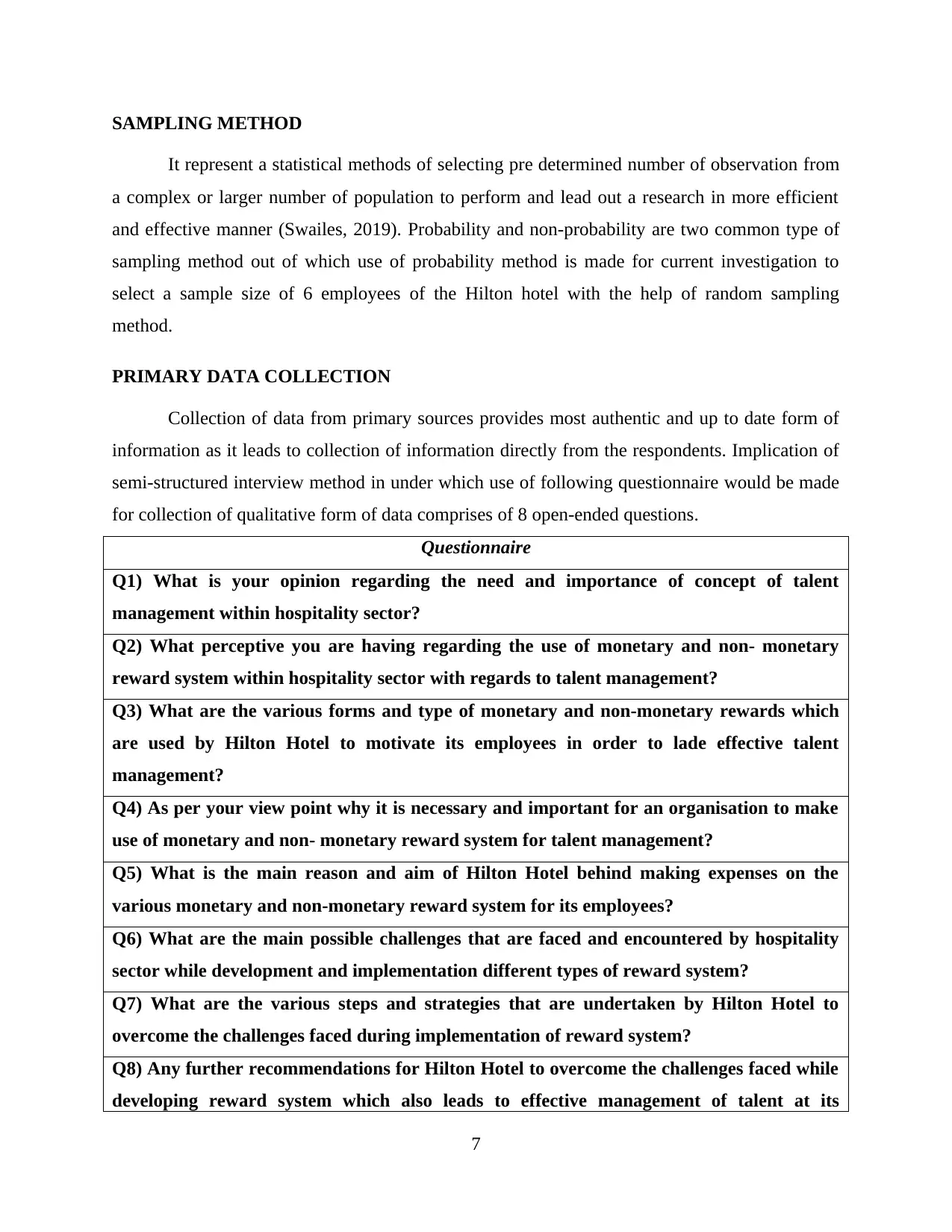
SAMPLING METHOD
It represent a statistical methods of selecting pre determined number of observation from
a complex or larger number of population to perform and lead out a research in more efficient
and effective manner (Swailes, 2019). Probability and non-probability are two common type of
sampling method out of which use of probability method is made for current investigation to
select a sample size of 6 employees of the Hilton hotel with the help of random sampling
method.
PRIMARY DATA COLLECTION
Collection of data from primary sources provides most authentic and up to date form of
information as it leads to collection of information directly from the respondents. Implication of
semi-structured interview method in under which use of following questionnaire would be made
for collection of qualitative form of data comprises of 8 open-ended questions.
Questionnaire
Q1) What is your opinion regarding the need and importance of concept of talent
management within hospitality sector?
Q2) What perceptive you are having regarding the use of monetary and non- monetary
reward system within hospitality sector with regards to talent management?
Q3) What are the various forms and type of monetary and non-monetary rewards which
are used by Hilton Hotel to motivate its employees in order to lade effective talent
management?
Q4) As per your view point why it is necessary and important for an organisation to make
use of monetary and non- monetary reward system for talent management?
Q5) What is the main reason and aim of Hilton Hotel behind making expenses on the
various monetary and non-monetary reward system for its employees?
Q6) What are the main possible challenges that are faced and encountered by hospitality
sector while development and implementation different types of reward system?
Q7) What are the various steps and strategies that are undertaken by Hilton Hotel to
overcome the challenges faced during implementation of reward system?
Q8) Any further recommendations for Hilton Hotel to overcome the challenges faced while
developing reward system which also leads to effective management of talent at its
7
It represent a statistical methods of selecting pre determined number of observation from
a complex or larger number of population to perform and lead out a research in more efficient
and effective manner (Swailes, 2019). Probability and non-probability are two common type of
sampling method out of which use of probability method is made for current investigation to
select a sample size of 6 employees of the Hilton hotel with the help of random sampling
method.
PRIMARY DATA COLLECTION
Collection of data from primary sources provides most authentic and up to date form of
information as it leads to collection of information directly from the respondents. Implication of
semi-structured interview method in under which use of following questionnaire would be made
for collection of qualitative form of data comprises of 8 open-ended questions.
Questionnaire
Q1) What is your opinion regarding the need and importance of concept of talent
management within hospitality sector?
Q2) What perceptive you are having regarding the use of monetary and non- monetary
reward system within hospitality sector with regards to talent management?
Q3) What are the various forms and type of monetary and non-monetary rewards which
are used by Hilton Hotel to motivate its employees in order to lade effective talent
management?
Q4) As per your view point why it is necessary and important for an organisation to make
use of monetary and non- monetary reward system for talent management?
Q5) What is the main reason and aim of Hilton Hotel behind making expenses on the
various monetary and non-monetary reward system for its employees?
Q6) What are the main possible challenges that are faced and encountered by hospitality
sector while development and implementation different types of reward system?
Q7) What are the various steps and strategies that are undertaken by Hilton Hotel to
overcome the challenges faced during implementation of reward system?
Q8) Any further recommendations for Hilton Hotel to overcome the challenges faced while
developing reward system which also leads to effective management of talent at its
7
Paraphrase This Document
Need a fresh take? Get an instant paraphrase of this document with our AI Paraphraser
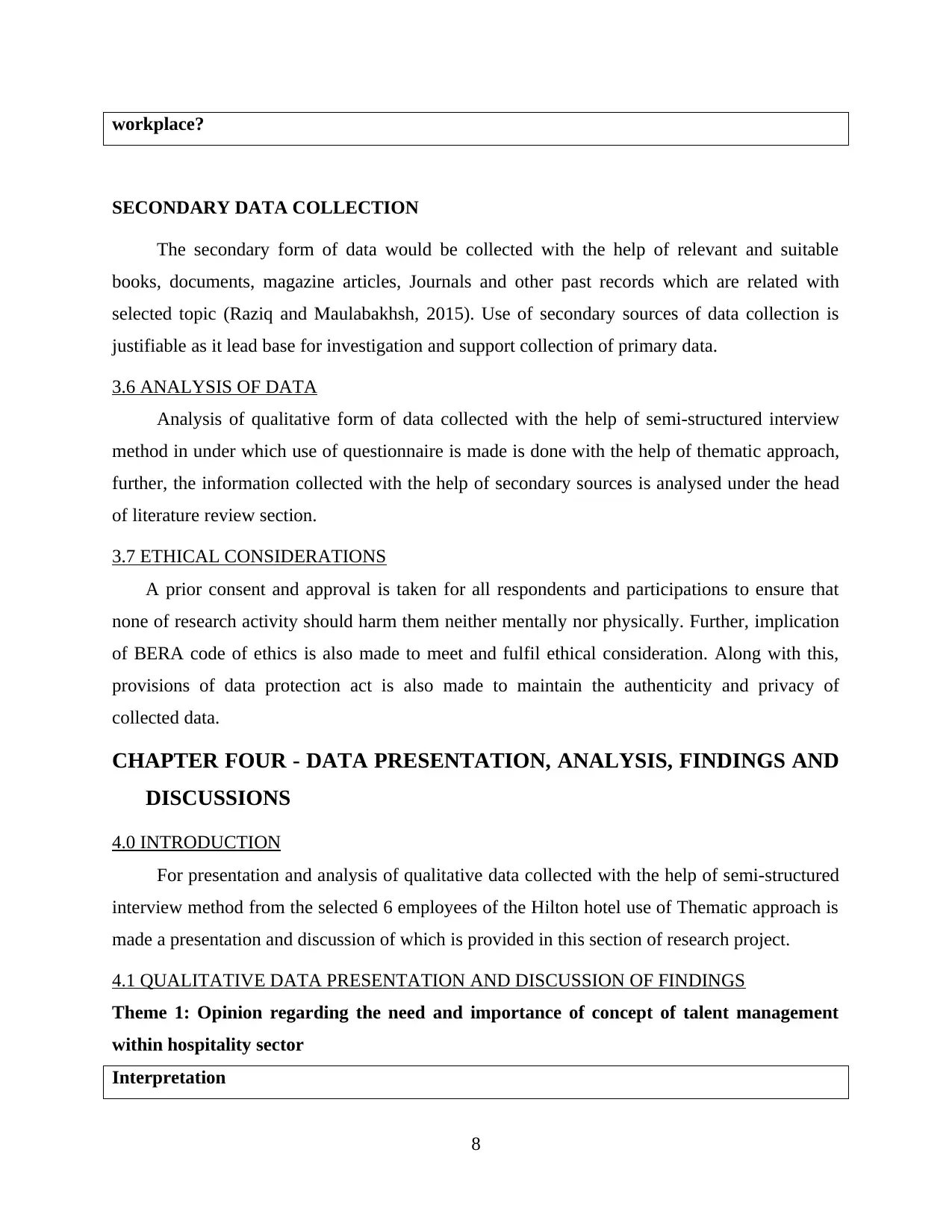
workplace?
SECONDARY DATA COLLECTION
The secondary form of data would be collected with the help of relevant and suitable
books, documents, magazine articles, Journals and other past records which are related with
selected topic (Raziq and Maulabakhsh, 2015). Use of secondary sources of data collection is
justifiable as it lead base for investigation and support collection of primary data.
3.6 ANALYSIS OF DATA
Analysis of qualitative form of data collected with the help of semi-structured interview
method in under which use of questionnaire is made is done with the help of thematic approach,
further, the information collected with the help of secondary sources is analysed under the head
of literature review section.
3.7 ETHICAL CONSIDERATIONS
A prior consent and approval is taken for all respondents and participations to ensure that
none of research activity should harm them neither mentally nor physically. Further, implication
of BERA code of ethics is also made to meet and fulfil ethical consideration. Along with this,
provisions of data protection act is also made to maintain the authenticity and privacy of
collected data.
CHAPTER FOUR - DATA PRESENTATION, ANALYSIS, FINDINGS AND
DISCUSSIONS
4.0 INTRODUCTION
For presentation and analysis of qualitative data collected with the help of semi-structured
interview method from the selected 6 employees of the Hilton hotel use of Thematic approach is
made a presentation and discussion of which is provided in this section of research project.
4.1 QUALITATIVE DATA PRESENTATION AND DISCUSSION OF FINDINGS
Theme 1: Opinion regarding the need and importance of concept of talent management
within hospitality sector
Interpretation
8
SECONDARY DATA COLLECTION
The secondary form of data would be collected with the help of relevant and suitable
books, documents, magazine articles, Journals and other past records which are related with
selected topic (Raziq and Maulabakhsh, 2015). Use of secondary sources of data collection is
justifiable as it lead base for investigation and support collection of primary data.
3.6 ANALYSIS OF DATA
Analysis of qualitative form of data collected with the help of semi-structured interview
method in under which use of questionnaire is made is done with the help of thematic approach,
further, the information collected with the help of secondary sources is analysed under the head
of literature review section.
3.7 ETHICAL CONSIDERATIONS
A prior consent and approval is taken for all respondents and participations to ensure that
none of research activity should harm them neither mentally nor physically. Further, implication
of BERA code of ethics is also made to meet and fulfil ethical consideration. Along with this,
provisions of data protection act is also made to maintain the authenticity and privacy of
collected data.
CHAPTER FOUR - DATA PRESENTATION, ANALYSIS, FINDINGS AND
DISCUSSIONS
4.0 INTRODUCTION
For presentation and analysis of qualitative data collected with the help of semi-structured
interview method from the selected 6 employees of the Hilton hotel use of Thematic approach is
made a presentation and discussion of which is provided in this section of research project.
4.1 QUALITATIVE DATA PRESENTATION AND DISCUSSION OF FINDINGS
Theme 1: Opinion regarding the need and importance of concept of talent management
within hospitality sector
Interpretation
8
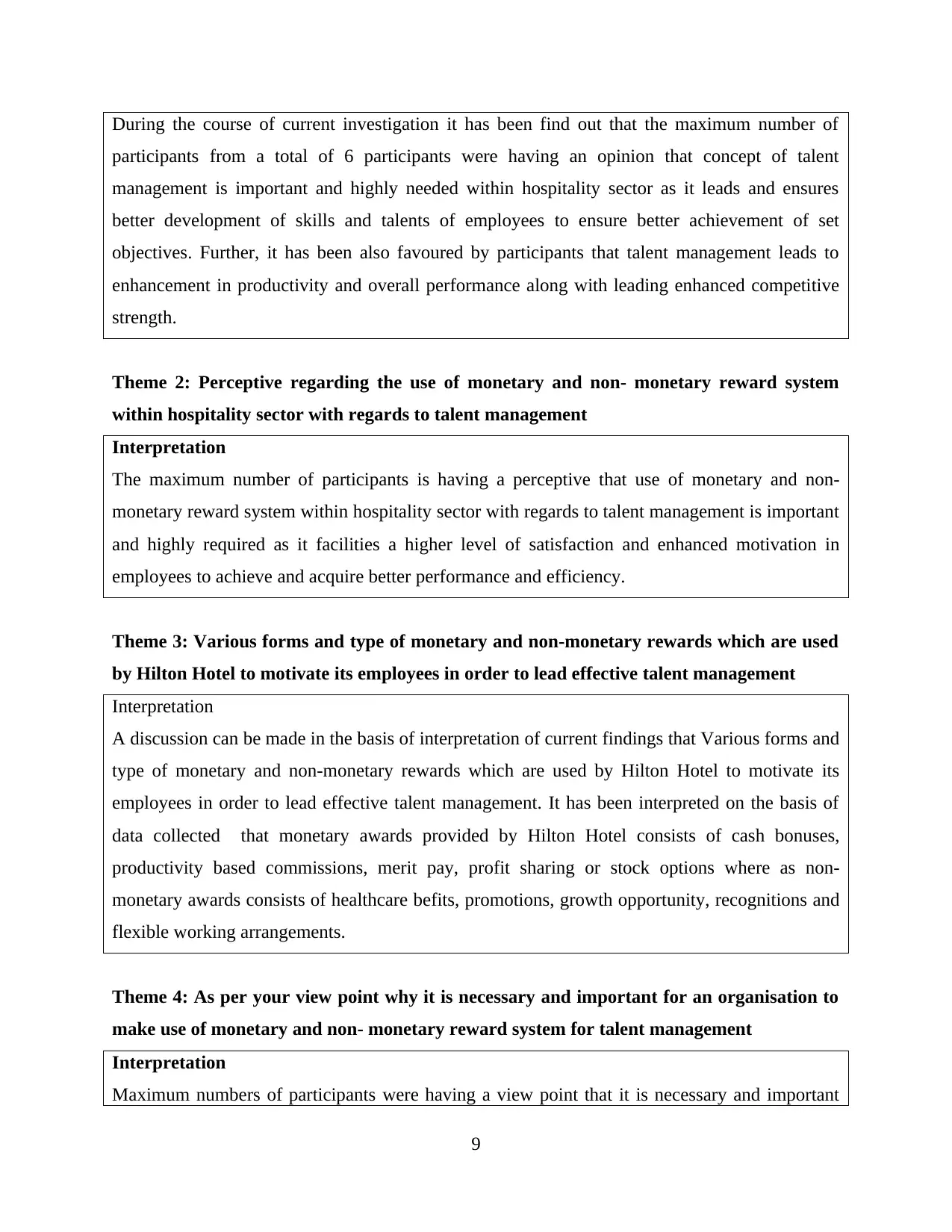
During the course of current investigation it has been find out that the maximum number of
participants from a total of 6 participants were having an opinion that concept of talent
management is important and highly needed within hospitality sector as it leads and ensures
better development of skills and talents of employees to ensure better achievement of set
objectives. Further, it has been also favoured by participants that talent management leads to
enhancement in productivity and overall performance along with leading enhanced competitive
strength.
Theme 2: Perceptive regarding the use of monetary and non- monetary reward system
within hospitality sector with regards to talent management
Interpretation
The maximum number of participants is having a perceptive that use of monetary and non-
monetary reward system within hospitality sector with regards to talent management is important
and highly required as it facilities a higher level of satisfaction and enhanced motivation in
employees to achieve and acquire better performance and efficiency.
Theme 3: Various forms and type of monetary and non-monetary rewards which are used
by Hilton Hotel to motivate its employees in order to lead effective talent management
Interpretation
A discussion can be made in the basis of interpretation of current findings that Various forms and
type of monetary and non-monetary rewards which are used by Hilton Hotel to motivate its
employees in order to lead effective talent management. It has been interpreted on the basis of
data collected that monetary awards provided by Hilton Hotel consists of cash bonuses,
productivity based commissions, merit pay, profit sharing or stock options where as non-
monetary awards consists of healthcare befits, promotions, growth opportunity, recognitions and
flexible working arrangements.
Theme 4: As per your view point why it is necessary and important for an organisation to
make use of monetary and non- monetary reward system for talent management
Interpretation
Maximum numbers of participants were having a view point that it is necessary and important
9
participants from a total of 6 participants were having an opinion that concept of talent
management is important and highly needed within hospitality sector as it leads and ensures
better development of skills and talents of employees to ensure better achievement of set
objectives. Further, it has been also favoured by participants that talent management leads to
enhancement in productivity and overall performance along with leading enhanced competitive
strength.
Theme 2: Perceptive regarding the use of monetary and non- monetary reward system
within hospitality sector with regards to talent management
Interpretation
The maximum number of participants is having a perceptive that use of monetary and non-
monetary reward system within hospitality sector with regards to talent management is important
and highly required as it facilities a higher level of satisfaction and enhanced motivation in
employees to achieve and acquire better performance and efficiency.
Theme 3: Various forms and type of monetary and non-monetary rewards which are used
by Hilton Hotel to motivate its employees in order to lead effective talent management
Interpretation
A discussion can be made in the basis of interpretation of current findings that Various forms and
type of monetary and non-monetary rewards which are used by Hilton Hotel to motivate its
employees in order to lead effective talent management. It has been interpreted on the basis of
data collected that monetary awards provided by Hilton Hotel consists of cash bonuses,
productivity based commissions, merit pay, profit sharing or stock options where as non-
monetary awards consists of healthcare befits, promotions, growth opportunity, recognitions and
flexible working arrangements.
Theme 4: As per your view point why it is necessary and important for an organisation to
make use of monetary and non- monetary reward system for talent management
Interpretation
Maximum numbers of participants were having a view point that it is necessary and important
9
⊘ This is a preview!⊘
Do you want full access?
Subscribe today to unlock all pages.

Trusted by 1+ million students worldwide
1 out of 18
Related Documents
Your All-in-One AI-Powered Toolkit for Academic Success.
+13062052269
info@desklib.com
Available 24*7 on WhatsApp / Email
![[object Object]](/_next/static/media/star-bottom.7253800d.svg)
Unlock your academic potential
Copyright © 2020–2026 A2Z Services. All Rights Reserved. Developed and managed by ZUCOL.





